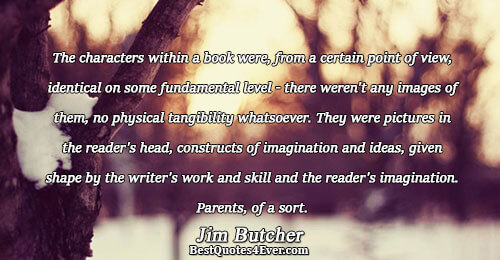Beneath my eyes opens - a book; I see to the bottom; the heart - I see to the depths. I know what loves are trembling into fire; how jealousy shoots its green flashes hither and thither; how intricately love crosses love; love makes knots; love brutally tears them apart. I have been knotted; I have been torn apart.

The characters within a book were, from a certain point of view, identical on some fundamental level ‒ there weren't any images of them, no physical tangibility whatsoever. They were pictures in the reader's head, constructs of imagination and ideas, given shape by the writer's work and skill and the reader's imagination. Parents, of a sort.
Books and drafts mean something quite different for different thinkers. One collects in a book the lights he was able to steal and carry home swiftly out of the rays of some insight that suddenly dawned on him, while another thinker offers us nothing but shadows - images in black and grey of what had built up in his soul the day before.
The thought of these vast stacks of books would drive him mad: the more he read, the less he seemed to know - the greater the number of the books he read, the greater the immense uncountable number of those which he could never read would seem to be…. The thought that other books were waiting for him tore at his heart forever.
Do you know the feeling when you start reading a new book before the membrane of the last one has had time to close behind you? You leave the previous book with ideas and themes–characters even–caught in the fibers of your clothes, and when you open the new book, they are still with you
Adventure,' then, is what might otherwise be called hardship if it were attempted in a different spirit. Turning a difficult task or a perilous journey into an adventure is largely a matter of telling yourself the right story about it, which is one thing that Lewis's child characters have learned from reading, 'the right books.